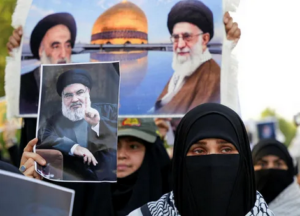Israel’s obsession with assassinating its enemies from Beirut to Tehran will cause a forever war

A woman holds a picture of Hassan Nasrallah who was killed by an Israeli airstrike in Beirut, during a symbolic funeral in Basra, Iraq, 29 September 2024
Odeh Bisharat writes in Haaretz on 30 September 2024:
Israel relates to its Arab enemies as if they were a pack of wolves: If you take out the alpha male, the pack disperses.
I don’t know the source of its obsession with killing the leaders of its enemies – the Palestinians, the Lebanese and even the Iranians – but the approach is wrong: Leaders are an important asset not only for their public, but also for the enemy.
When the parties eventually reach agreements, there needs to be someone from the other side to sign them: a leader whose public will support them if they turn the steering wheel 180 degrees, from confrontation to conciliation.
Was any Palestinian leader besides Yasser Arafat capable of signing the Oslo Accords, which many regarded as a renunciation of the principles of the Palestinian struggle? Only Arafat, with his credibility and popularity, was capable of persuading the Palestinians to accept the agreement.
And today, will anyone in the Hezbollah leadership agree to a cease-fire after the assassination of their leader? Anyone who dares to do so will almost certainly be seen as betraying Hassan Nasrallah’s legacy.
When a leader is assassinated, then, the damage is not only to the followers but also to the possibility of reaching an agreement with the other side. When a cease-fire agreement with Hezbollah was almost within reach, as American and French sources say it was, we cannot help but ask whether the purpose of the assassination was to prevent it.
During the first period of the U.S. occupation of Iraq, the country’s American administrator, Paul Bremer, fired over 30,000 commanders in the Iraqi army on the pretext that they were loyal to the dictatorial regime of Saddam Hussein. Some of these commanders went on to become the foundation of ISIS.
Did Israeli decision-makers not consider this when they ordered the assassinations of a slew of Hezbollah commanders? Perhaps they were thinking instead about the chaos that was liable to result in a divided Lebanon when soldiers, in the absence of commanders, are free to do as they please. Was this not discussed when the decision to crush Hezbollah’s leadership was made?
There is a well-known saying that the only thing we learn from history is that we learn nothing from history. After all, we went down the same road after the 1992 assassination of Abbas al-Musawi. He was succeeded as the leader of Hezbollah by Nasrallah, who expanded the organization’s capabilities exponentially.
Around two years later, 85 people were killed and hundreds more were injured in the bombing of the AMIA Jewish community center in Buenos Aires in Argentina.
After the apocalyptic accomplishment of the pager and walkie-talkie explosions that have been attributed to it – which stirred leftists’ national pride before that of rightists, and after the “precisely targeted” strikes on Hezbollah leaders, in which hundreds of Lebanese civilians died – Israel is a state that projects force, and only force.
Today, America the Great is assiduously striving to sign a new nuclear arms deal with Iran, and Israel is already talking about the next target for assassination – Ayatollah Ali Khamenei, Iran’s supreme leader.
Instead of dialogue, there are targeted killings, and horror falls on the surrounding nations.
But horror does not stop at borders. It crosses them. It’s enough to look at the relatives of the hostages: Every cry of joy over Nasrallah’s death causes their hearts to plummet in fear for the fate of their loved ones who are rotting away in the tunnels of the Strip.
In “The Godfather Part III,” Michael Corleone (Al Pacino) wishes that he could be a good man, someone who is “so loved” instead of being “so feared,” but he does not repent. Israel chose to be Michael Corleone, to terrorize its surroundings, and the result is endless wars and a neighborhood that rejects it.
This article is reproduced in its entirety
